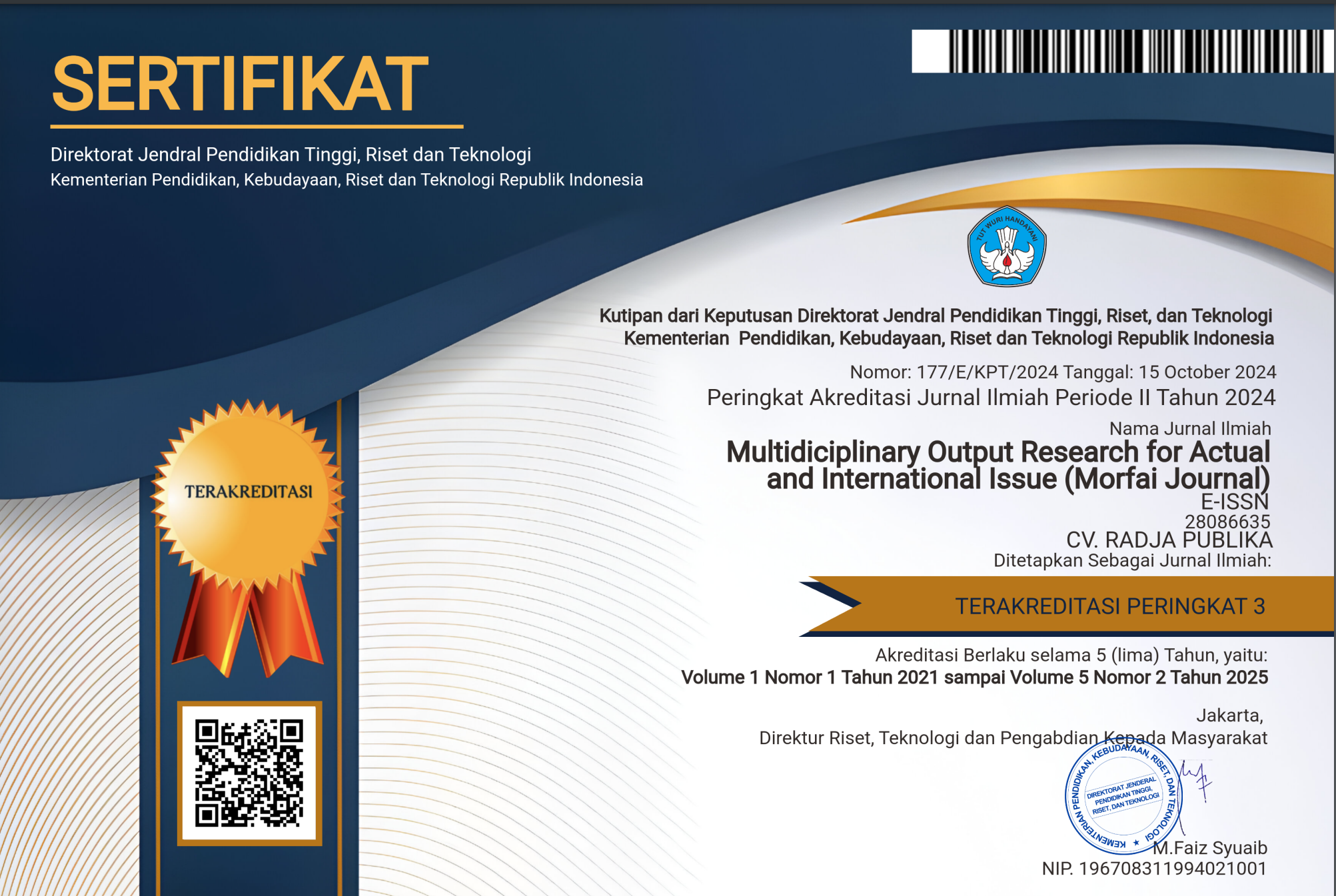INTEGRATION OF ARTIFICIAL INTELLIGENCE IN RISK MANAGEMENT TO IMPROVE BUSINESS SUSTAINABILITY
Main Article Content
Franciskus Antonius Alijoyo
The integration of artificial intelligence (AI) in risk management offers a significant improvement in a company's ability to identify and handle risks more efficiently and accurately. AI enables in-depth and predictive data analysis, so that organisations can detect potential threats earlier and take proactive measures to mitigate them. The result is more efficient operations and more sustainable strategies. However, the successful implementation of AI in risk management requires employee training and the ethical use of this technology. With the right preparation, AI can play an important role in improving business sustainability and competitiveness.
Alijoyo, A. (2004). Focused enterprise risk management. PT Ray, Jakarta, Indonesia.
Alijoyo, A., Bouma, E., TB, M., Sutawinangun, N., & Kusadrianto, M. D. (2004). Review of Corporate Governance in Asia: Corporate Governance in Indonesia. Forum for Corporate Governance in Indonesia, 2(2), 89–103.
Alijoyo, F. A. (2024). AI-powered deep learning for sustainable industry 4.0 and internet of things: Enhancing energy management in smart buildings. Alexandria Engineering Journal, 104, 409–422. https://doi.org/10.1016/j.aej.2024.07.110
Alijoyo, F. A., & Munawar, Y. (2019). FAKTOR YANG MEMPENGARUHI MATURITAS MANAJEMEN RISIKO ORGANISASI DI INDONESIA. Bina Ekonomi, 23(1), Article 1. https://doi.org/10.26593/be.v23i1.4366.67-79
Alijoyo, F. A., & Norimarna, S. (2021). Risk management maturity assessment based on ISO 31000-A pathway toward the organization’s resilience and sustainability post covid-19: The Case Study of SOE Company in Indonesia. 3rd International Conference on Management, Economics & Finance, 125.
Anderson, B. (2020). Using AI to Enhance Risk Management in E-commerce. E-Commerce Research and Applications, 37, 100859. https://doi.org/10.1016/j.elerap.2020.100859
Brown, A. (2019). The Role of Artificial Intelligence in Risk Management. Journal of Risk Research, 22(5), 697–715. https://doi.org/10.1080/13669877.2018.1491964
Bryant, A., & Kingsley, G. (2019). AI in Business: Myths and Realities. Routledge.
Carter, N. (2021). Artificial Intelligence Applications in Environmental Risk Management. Environmental Research, 194, 110697. https://doi.org/10.1016/j.envres.2020.110697
Chung, W., & Tan, C. (2020). AI-driven Risk Management Solutions. Expert Systems with Applications, 139, 112–125. https://doi.org/10.1016/j.eswa.2020.112769
Doukas, A. (2020). Leveraging Machine Learning for Credit Risk Management. Quantitative Finance, 20(8), 1267–1279. https://doi.org/10.1080/14697688.2020.1787163
Garvey, M. (2019). Risk Management Strategies with AI in Digital Marketing. Journal of Interactive Marketing, 47, 108–123. https://doi.org/10.1177/1094996819870756
Goodfellow, I., Bengio, Y., & Courville, A. (2016). Deep Learning. MIT Press.
Gough, D., Thomas, J., & Oliver, S. (2012). An Introduction to Systematic Reviews. SAGE Publications Ltd.
Gupta, S. (2019). Artificial Intelligence in Risk Management: A Comprehensive Review. Risk Analysis, 39(2), 336–349. https://doi.org/10.1111/risa.13198
Hill, S. (2019). AI as a Strategic Tool for Risk Management. Strategic Management Journal, 40(6), 938–962. https://doi.org/10.1002/smj.3033
Hughes, T. (2018). The Future of Risk Management with AI. Futures, 95, 20–34. https://doi.org/10.1016/j.futures.2017.11.009
Kim, H., & Jeong, S. (2020). The Impact of AI on Risk Management Processes. International Journal of Information Management, 52, 101936. https://doi.org/10.1016/j.ijinfomgt.2020.101936
Lee, C., & Park, J. (2021). Integrating AI in Risk Assessment Practices. Journal of Risk and Financial Management, 14(7), 356–370. https://doi.org/10.3390/jrfm14070356
Lin, J., & Xiao, Y. (2020). Applying Machine Learning to Improve Cybersecurity and Risk Management. Cybersecurity Journal, 3(4), 204–217. https://doi.org/10.1007/s10207-020-00523-z
Nelson, T. (2019). AI for Financial Risk Management: Current Trends and Future Directions. Finance Research Letters, 29, 19–23. https://doi.org/10.1016/j.frl.2019.02.015
Ortiz, J. (2018). The Synergy of AI and Risk Management in Healthcare. Healthcare Management Review, 43(1), 32–45. https://doi.org/10.1097/HMR.0000000000000207
Patel, K. (2021). AI for Sustainable Risk Management in Infrastructure Projects. Infrastructure Systems, 27(1), 51–65. https://doi.org/10.1080/15732479.2020.1857497
Russell, M. A. (2013). Mining the social web: Data mining Facebook, Twitter, LinkedIn, Google+, GitHub, and more. O’Reilly Media, Inc.
Singh, R., & Chen, D. (2018). Sustainable Business Practices: The Role of AI in Risk Management. Sustainability, 10(4), 1085–1102. https://doi.org/10.3390/su10041085
Smith, M. S. (2021). Integrating AI into Risk Management for Sustainable Business Practices. Journal of Business Ethics, 164(2), 333–346. https://doi.org/10.1007/s10551-020-04587-1
Torraco, R. J. (2005). Writing Integrative Literature Reviews: Guidelines and Examples. Human Resource Development Review, 4(3), 356–367.
Wang, X., & Song, W. (2020). AI and Risk Management in the Financial Sector: Enhancing Business Sustainability. The International Journal of Financial Studies, 8(1), 12. https://doi.org/10.3390/ijfs8010012
Warren, R. (2020). Adopting AI Technologies in Corporate Risk Management. Corporate Risk Management, 15(2), 87–102. https://doi.org/10.1017/crm.2020.0012
Webster, J., & Watson, R. T. (2002). Analyzing the Past to Prepare for the Future: Writing a Literature Review. MIS Quarterly, 26(2), xiii–xxiii.
Westerman, G. (2018). How AI Is Streamlining Risk Management and Sustainability Strategies in Business. MIT Sloan Management Review. https://sloanreview.mit.edu/article/how-ai-is-streamlining-risk-management-and-sustainability-strategies-in-business/
Zhao, Y. (2021). Leveraging AI for Enhanced Risk Management in Fintech. Fintech Journal, 16(1), 23–35. https://doi.org/10.1002/finj.202100002









